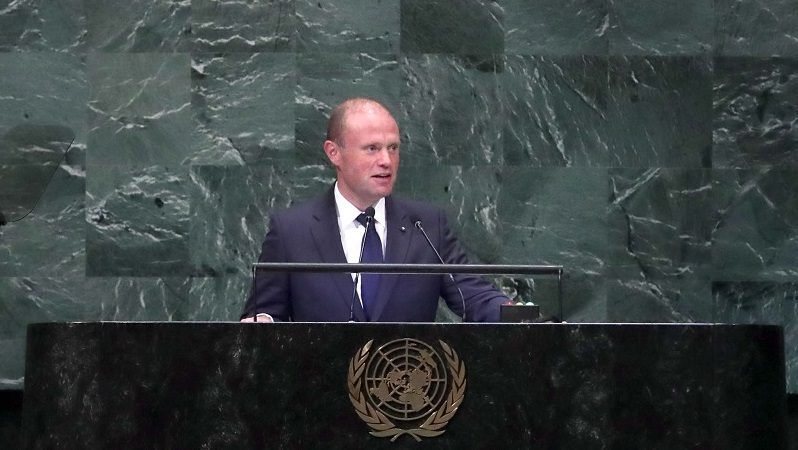Last week, Joseph Muscat delivered his annual speech to the UN General Assembly where he said the world “was witnessing the globalisation of hatred” and highlighted the need for political leaders to show statesmanship and make “the right choices” over “popular ones”. The Shift News gives his speech a reality check.
Muscat-speak: “Of course, we must respect the sovereignty of all nations, and we have no right to stand before you to judge. But those who are closing themselves off to debate are falsely believing they will escape certain issues.”
Reality: Since his last interview with BBC Newsnight in January that earned him the title ‘Artful Dodger of Europe,’ Muscat has consistently refused interviews with the press. Instead, he has resorted to a Sunday ‘sermon’ on his Party radio station, sometimes upgraded to a political activity where he can be cheered by his followers.
Muscat used 1 May celebrations to call for a show of support in response to international investigative journalists launching The Daphne Project . His appeal: “With regards certain things that were organised in the past few days, the best response will be to gather as a united country on 1st May [at a Labour Party mass meeting].” Muscat’s supporters were given professionally printed placards with “#JOSEPHMUSCATPROJECT” emblazoned across them.
Muscat said, “there will be repercussions for people who are caught lying to smear Malta’s name”. He even told Portuguese socialist MEP Ana Gomes that he “only reacts to comments made by Prime Ministers” when she questioned his integrity. Hardly an example of a political leader open to debate.
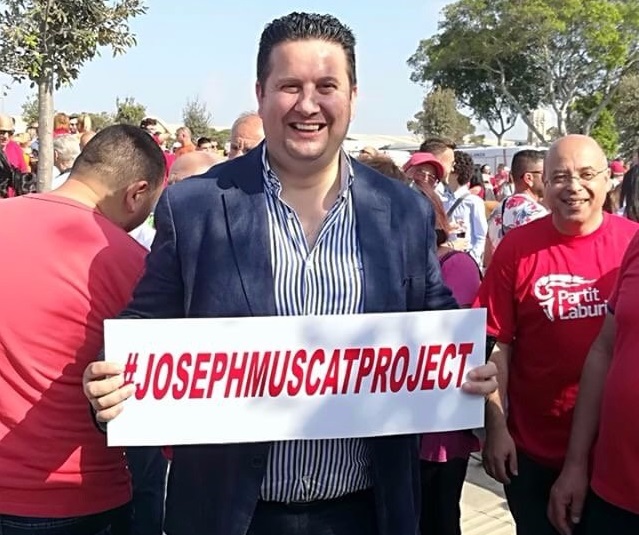
Muscat-speak: “We are seeing divisions not just amongst global leaders and nations, but within our own societies, neighbourhoods, and even families.”
Reality: It’s hard to say whether Maltese society has ever been as polarised as it is today. What’s clear is that Muscat himself has been a powerful polarising force going so far as to rally partisan support as a cover for graft and money laundering allegations uncovered in the Panama Papers.
The Shift News investigation into Labour’s secret Facebook groups revealed that Muscat, before being exposed earlier this year, was a member of the hyper-partisan groups targeting opposition politicians and anti-corruption activists, where members celebrated Caruana Galizia’s assassination.
Government officials and “consultants” including four of Muscat’s closest aides – Josef Cutajar, Glenn Bedingfield, Neville Gafa and Tony Zarb – are responsible for some of the most abhorrent online comments, calling protestors “whores”, spreading conspiracy theories implicating Caruana Galizia’s own family in her assassination, and attacking journalists and activists.
Muscat-speak: “And many feel the international community has failed in providing solutions to these concerns. This has given rise to movements that preach a single, simplistic solution to a complex phenomenon.”
Reality: Here, Muscat is talking about asylum-seeker flows into Europe. Soon after his 2013 election, Muscat called for a “pushback” to Libya of 45 Somali asylum seekers before their cases for asylum were heard, which is illegal under the European Convention on Human Rights.
Muscat was stopped when a group of 69 Maltese lawyers filed a judicial protest against his government over its pushback plans, and when the European Court of Human Rights handed the Maltese government a Rule 39 interim order blocking the asylum seekers’ return to Libya. The order was handed to Muscat as he was railing against asylum seekers in Malta’s parliament.
Muscat boasts about how he is successfully achieving EU burden sharing migration solutions, while stoking xenophobia at home.
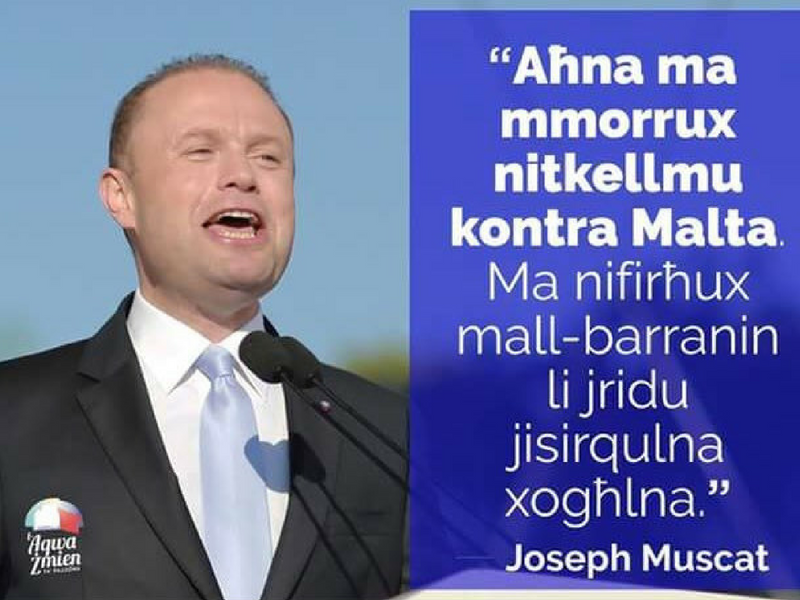
“We don’t tarnish Malta’s name. We don’t celebrate with foreigners who want to steal our jobs” – Joseph Muscat
As recently as last week, Muscat identified “Africans” as being the main source of troublesome immigration, indicating that authorities are checking migrants’ papers in certain localities. This (and subsequent reports) in turn led to claims of racial profiling by police.
Muscat also continues to refuse entry to NGO vessels calling them traffickers, and seizes rescue vessels which Malta is obliged to receive on humanitarian grounds.
Muscat-speak: “[Malta] ranks among the highest worldwide in terms of the number of asylum applications per capita.”
Reality: An analysis carried out by The Times of Malta showed that the number of asylum seekers in Malta is nowhere near the highs experienced during the Arab Spring and Libya uprising. Indeed despite all the repeated rhetoric (Muscat mentioned last week that “hundreds of boats” with migrants are crossing the Mediterranean each day) numbers of crossings in the Central Mediterranean are at an all time low.
This repeated anti-migrant rhetoric (now also picked up by the Opposition leader) while at the same time pursuing an irresponsibly loose policy in relation to non-EEA imported cheap labour, continues to feed the perception gap in Malta.
Recently reported statistics show that new work permits per month (2,000) exceed by far the number of asylum seekers per year.
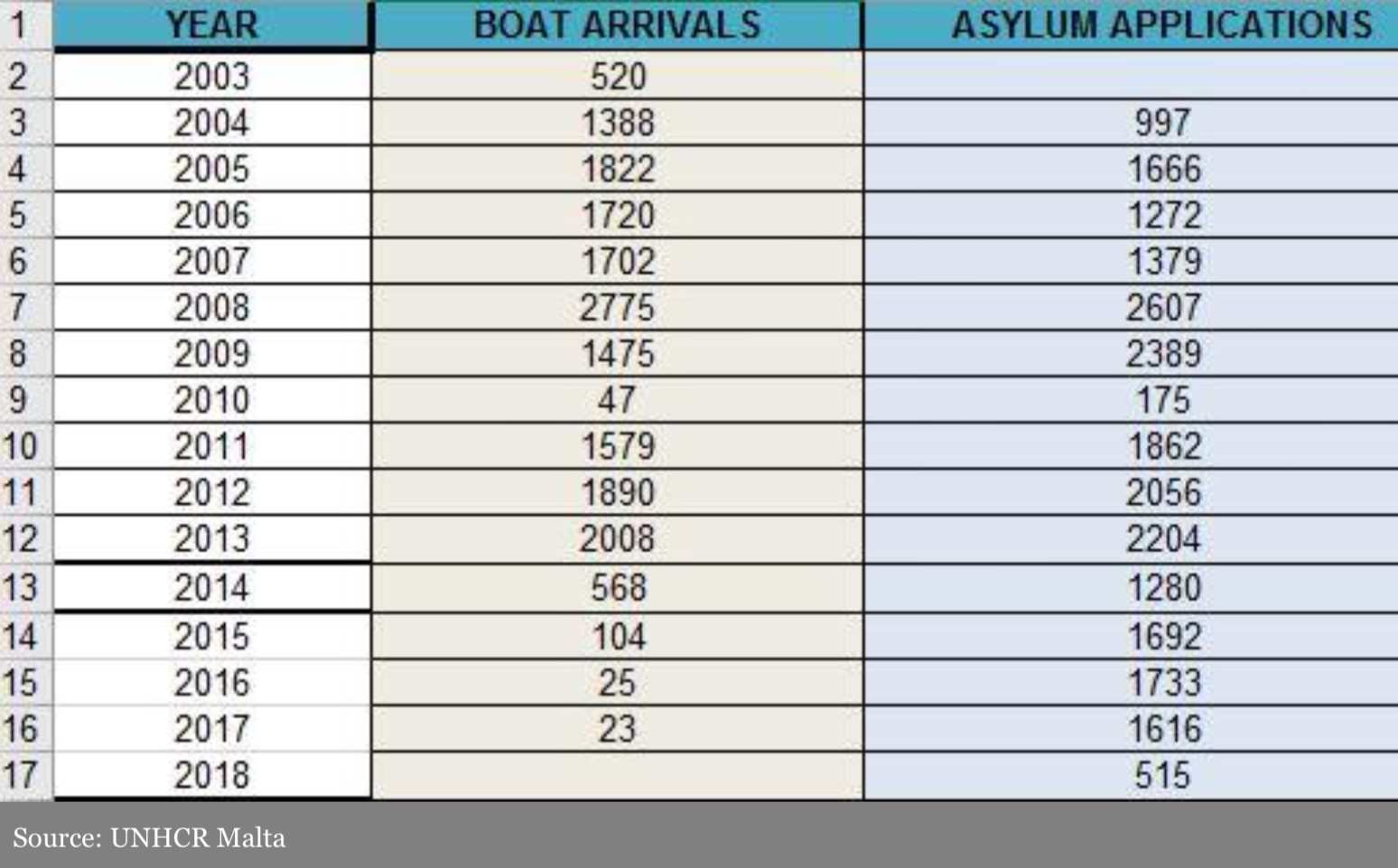
Muscat-speak: “Narratives that use inflated or false facts, and thrive on the fear of a nation being open have led to painful outcomes in history.”
Reality: The Shift News Disinformation Watch has today hit its 20th episode in the weekly series. It’s uncovered false government statistics and the spreading of fake news, astroturfing of political polls, the manipulation of EC reporting and the obfuscation of human rights abuses, among other uses of disinformation.
In the same week Muscat addressed the UN, Muscat also put his name to an op-ed by European leaders warning against the rise of fascism and the collapse of the rule of law in Hungary and Poland even as he continues to face accusations of undermining it at home.
Muscat-speak: “…in Malta, we have launched ourselves as the Blockchain Island by being the first jurisdiction to regularise a new technology that previously existed in a legal vacuum.”
Reality: Earlier this year the Maltese parliament passed three crypto-related Bills into law. As part of his sales pitch to lure companies into setting up in Malta, Junior Minister for cryptocurrency Silvio Schembri announced the bills’ enactment even before their third reading in Parliament.
While talking about “regularising a new technology” Muscat failed to mention the secret to Malta’s success – the law the government enacted allows cryptocurrency companies that move to Malta before October (later delayed to November) until November 2019 to apply for authorisation.
Until then, these companies will be exempt from the need for authorisation and be exempt from the need to comply with market abuse rules or with anti-money laundering laws – compliance is on a “best efforts” basis (in other words, ‘try but we’ll understand you’re doing the best you can’).
Meanwhile, Malta has attracted some of the biggest players in the field, exchanges seeing billions of transactions between tens of millions of users.
A recent study of 25 different cryptocurrency exchanges across Europe and the US revealed that only 32% perform full identity checks on their users.
Now these companies – some of which have a troubled past with bankers – want to set up their own Maltese bank. Malta is still dealing with the repercussions of Pilatus Bank, at the centre of international money laundering investigations with its owner arrested in the US.
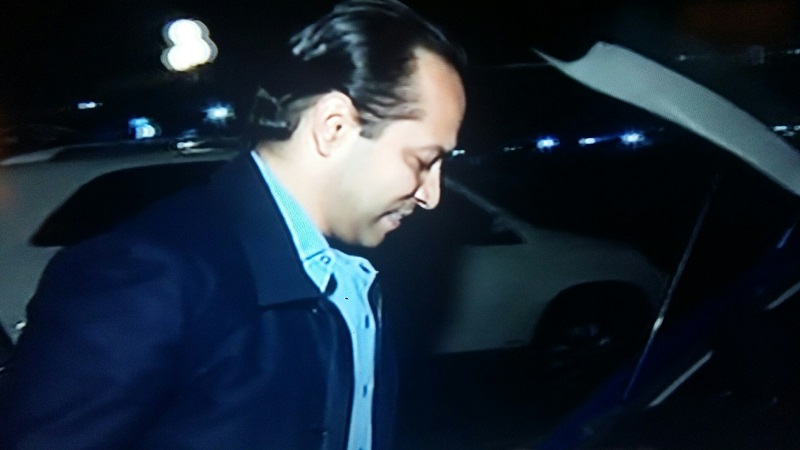
Muscat-speak: “Blockchain makes cryptocurrencies, the inevitable future of money, more transparent since it helps filter good business from bad business.”
Reality: Europol, the European Union Agency for Law Enforcement Cooperation, estimated that about 3-4% of the €113 billion in illicit proceeds in Europe were laundered through cryptocurrencies.
There is nothing “inevitable” about cryptocurrencies – in fact, the opposite is true. The main problem with cryptocurrency is the lack of transparency in the provenance of the money, together with the lack of information about the people behind the transactions.
If Muscat’s promise of regulation and transparency is to be taken seriously, he may want to start his efforts closer to home. His chief of staff Keith Schembri is under judicial investigation for money laundering (twice over), as is his Tourism Minister Konrad Mizzi.
Muscat-speak: “States will need to move from hoarding information on citizens to regulating an environment where citizens trust the handling of their data.”
Reality: Muscat’s government requested more Facebook data per citizen than any other country, according to data published by the social media giant in 2017.
Last week Muscat announced plans to install government CCTV cameras with facial recognition software across Malta “to curb antisocial behaviour”. The Malta IT Law Association warned that Muscat’s plan is a serious invasion of privacy, and is against Maltese and EU law.
In his address to the UN, as well as the op-ed he signed with political leaders last week, Muscat spoke of the need to sustain values and defend rights he is accused of actively undermining at home.
If Muscat believes in the need for debate, he should stop silencing citizens and undermining their right to protest. If he is really concerned about “the globalisation of hatred,” Muscat should start by dismantling closed Facebook groups used to target critics. If he is concerned about “divisions in our societies,” he would immediately dismiss the likes of Tony Zarb and Josef Caruana rather than reward them with opportunity.
If Muscat wants to be credible, he should set an example before telling political leaders to show statesmanship and make “the right choices”.

